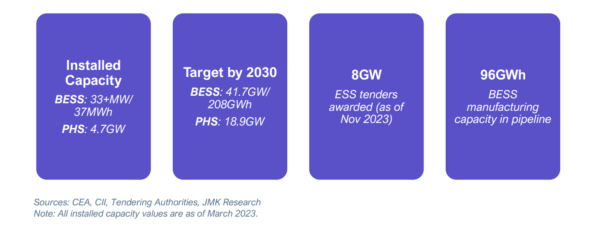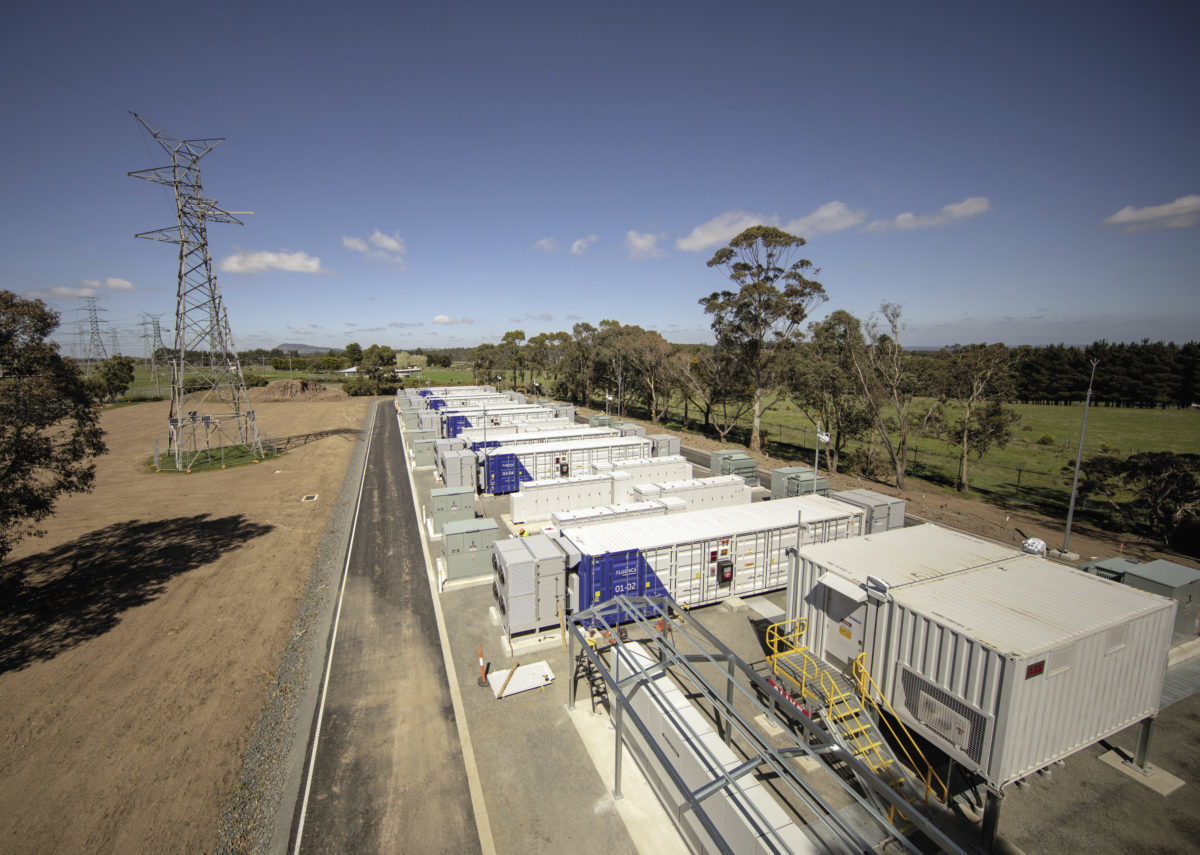India has awarded a cumulative grid-scale energy storage system (ESS) capacity of more than 8 GW in tenders as of November 2023, allocating 60% of the capacity in 2023 alone, according to a new joint report by the Institute for Energy Economics and Financial Analysis (IEEFA) and JMK Research & Analytics.
The report finds India’s ESS sector poised to boom in the coming years, in line with the exponential growth of the renewable energy sector.
“Globally, power systems across different regions are undergoing a pivotal phase of development,” says the report’s contributing author, Vibhuti Garg, Director, South Asia, IEEFA.
“The exponential surge in renewable energy installations within the past decade has exposed the grid infrastructure to increased risks arising from renewables’ intermittent and variable nature, especially solar and wind. ESS is crucial in overcoming this intermittency and enabling a continuous energy supply when needed. Thus, for sustainable renewable energy addition, a concurrent growth of ESS capacity is also imperative,” she adds.
A snapshot of the Indian ESS market

Battery-based ESS (BESS) and pumped hydro storage (PHS) are the most widespread and commercially viable means for implementing energy storage solutions in India, with green hydrogen expected to gain a greater share of the renewable energy mix in coming years.
The Central Electricity Authority estimates India will need about 42 GW of BESS and 19 GW of pumped hydro storage (PHS) capacity by 2030.
Large, grid-scale ESS projects will be crucial in meeting these future energy needs. To this end, the latest demand-driven Firm and Dispatchable Renewable Energy (FDRE) tenders offer the ideal model for India.
“FDRE tenders, first issued in 2023, are demand profile-driven tenders to ensure firmness and dispatchability of renewable energy, and create a win-win scenario for power developers and offtakers,” says the report’s co-author, Jyoti Gulia, Founder, JMK Research.
“With similar power quality and declining costs of renewable energy and ESS, FDRE can potentially replace thermal, a situation electricity distribution companies (DISCOMs) are already exploring,” she adds.
FDRE is the latest, most advanced iteration of tender models, such as round-the-clock (RTC), Solar + BESS and standalone ESS, offering tariffs already comparable to, if not lower than, traditional fossil fuel-based power generation.
Their tariffs will likely become even more attractive with longer tenures of up to 25 years as grid-scale FDRE storage projects mature.
“The discovered tariff in RTC tenders is lower than any peak power supply tenders, even though RTC tenders ensure higher availability and supply of renewable energy. This trend is due to the higher utilisation rate of ESS,” says the report’s co-author, Prabhakar Sharma, Consultant, JMK Research.
“Falling ESS costs, especially for BESS, and sustained cash flow over a longer duration enable ESS developers to quote lower tariffs,” he adds.
Policy measures like the energy storage obligation (ESO) targets are also helping create a conducive environment for ESS projects.
“ESS trading on power markets is also likely to increase in the coming years, driven by entities aiming to meet their energy storage obligation (ESO) targets and storage developers looking for avenues to sell the excess power from soon-to-be commissioned grid-scale ESS projects,” says Sharma.
“Other policy measures supporting the growth of ESS include the viability gap funding (VGF) scheme for BESS projects, the National Energy Storage Policy and the National Pumped Hydro Policy,” he adds.
However, obstacles to the expansion of ESS remain, such as high initial capital expenditure, longer gestation periods (especially for PHS projects), suboptimal infrastructure and a dearth of domestic manufacturing, highlighting potential supply chain risks.
“India aims to augment its VRE installed capacity (solar and wind) from 117GW to more than 392GW by 2030. This surge in VRE penetration needs to be supported by a simultaneous growth in ESS capacity,” says Gulia.
This content is protected by copyright and may not be reused. If you want to cooperate with us and would like to reuse some of our content, please contact: editors@pv-magazine.com.









1 comment
By submitting this form you agree to pv magazine using your data for the purposes of publishing your comment.
Your personal data will only be disclosed or otherwise transmitted to third parties for the purposes of spam filtering or if this is necessary for technical maintenance of the website. Any other transfer to third parties will not take place unless this is justified on the basis of applicable data protection regulations or if pv magazine is legally obliged to do so.
You may revoke this consent at any time with effect for the future, in which case your personal data will be deleted immediately. Otherwise, your data will be deleted if pv magazine has processed your request or the purpose of data storage is fulfilled.
Further information on data privacy can be found in our Data Protection Policy.